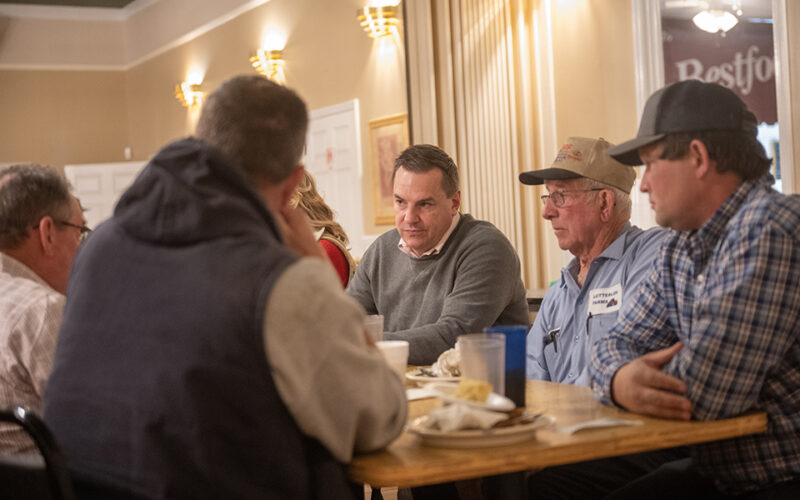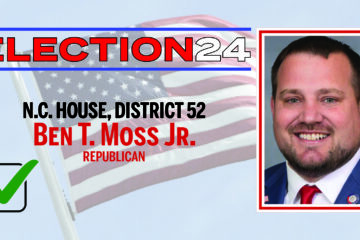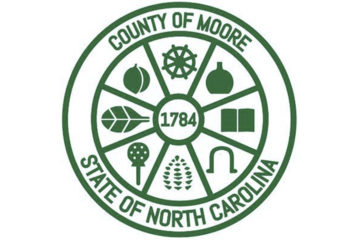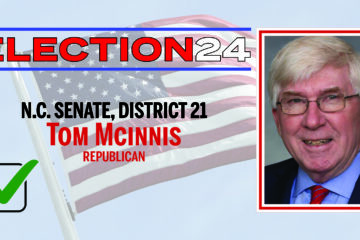SILER CITY — Congressman Richard Hudson (NC-09) joined farmers and agricultural interests for a discussion on Thursday, Feb. 8 at Bestfood Cafeteria in Siler City.
In between bites of fried chicken and refills of sweet tea, Hudson talked about the importance of the agriculture industry in North Carolina.
“Our farmers are backbone of our communities and in addition to providing us with the most abundant, cheapest food in the world, the food and fiber we need to survive as a country comes from our farmers,” Hudson told North State Journal. “I’ve always been committed to helping them fight off federal regulation, survive and be successful. The main part of that is building relationships with the farmers.”
Hudson, a Republican, told the group he has represented at least 23 different counties in various iterations across his six terms in Congress, and wants to know who he represents on a personal level and understanding the issues they care about.
His newly-redrawn North Carolina 9th Congressional district includes parts of Chatham, Guilford and Cumberland counties, plus the entirety of Alamance, Randolph, Moore and Hoke counties.
Some of those issues are long-running, such as regulations that can change from one presidential administration to the next. Hudson has been in Congress across three: the Obama, Trump and Biden administrations. He has endorsed 45th President Donald Trump to return to the White House this year.
Speaking about one of the issues, the controversial waters of the United States (WOTUS) regulations would again change the definition of “navigable waters” and require farmers to for nearly any activity that occurs within a WOTUS requires a permit, which can take years to obtain and cost tens or even hundreds of thousands of dollars, according to the American Farm Bureau (AFB). The group says a simple misjudgment by a farmer in determining whether a low spot is or isn’t WOTUS could trigger huge civil fines and even criminal punishment.
In addition, the AFB says that the EPA and U.S. Army Corps of Engineers have attempted to expand the definition of WOTUS to regulate land features that only occasionally get wet or become wet only in response to precipitation.
Hudson said that he opposes that kind of federal overreach.
“We all want clean air and clean water. Nobody wants it more than the farmer who loves their land. In many cases it’s multi-generational. They want to pass it on to their kids,” Hudson told NSJ.
Following a U.S. Supreme Court decision ordering the EPA to revise parts of the newest rules, although agriculture interests say it still places undue burdens on farmers.
Another issue Hudson addressed regarding farmland came from the issue of Chinese companies buying farmland and land next to U.S. military bases.
The N.C. House of Representatives took action on that issue last year, passing a bill that would prohibit China, Russia, Iran and other foreign adversaries and state-controlled entities from purchasing agricultural land or land within a 15-mile radius of a military base, military installation, or military airport.
“It concerns me particularly when they’re buying, not just buying farmland, but buying farmland next to military installations, next to key national security points of interest. I don’t think that’s a coincidence,” said Hudson. And, and I think it is a national security problem for us. I think in many cases when national security’s threatened we ought to take the land back.”
Another agricultural issue Hudson and those attending discussed was the H-2A temporary agricultural worker program and Proposition 12 in California, which imposes regulations on the raising of livestock.
“To me it’s an interstate commerce issue where you can’t have each state setting up different rules of the road for commerce,” said Hudson. “I’m very opposed to Proposition 12. I believe it’ll snowball, if they succeed there, they’ll expand it to poultry and other livestock. When regulations go beyond what’s necessary and start making it hard for folks to be able to produce it, that’s one you’ve got to push back.”
In closing, Hudson addressed the Farm Bill as one of the main pieces of legislation he thinks could pass in an election year.
The Farm Bill, which is supposed to be enacted every five years, is still operating under the 2018 legislation.
“It’s a bipartisan piece of legislation I think you can get a lot of support from both sides of the aisle. That’s something I’m pushing for. We obviously have to get our spending bills done for the current fiscal year and we’ve got to get the ones done before this summer for next fiscal year. We’ve got a lot of work in front of us and it’s gonna be very difficult,” Hudson said. “I’m hopeful that there are a number of big things we can get done and don’t have to just extend until next year after the election.”




